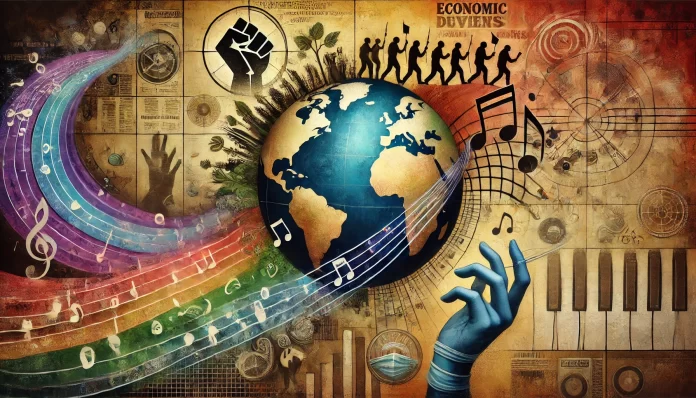
Music has long served as both a mirror and a megaphone for society, reflecting the most significant global events while amplifying emotions that are difficult to articulate. Whether during times of social unrest, political upheaval, or global crises, artists use their craft to capture the collective mood, inspire change, and offer solace. As we navigate an increasingly interconnected and turbulent world, the connection between global events and music trends has only grown stronger. This article explores how major global events shape music trends and how artists respond through their lyrics, genres, and overall artistic expression.
Political Movements and Social Unrest: Music as a Form of Protest
Music has always been a vehicle for political expression, giving voice to the marginalized and raising awareness about social injustice. Global events such as civil rights movements and protests have sparked some of history’s most powerful protest songs, creating cultural moments that resonate for decades.
The Black Lives Matter (BLM) movement, which gained global attention following the murder of George Floyd in 2020, ignited a wave of protest music that reflected the urgency and emotion of the moment. Tracks like J. Cole’s “Snow on Tha Bluff” and H.E.R.’s “I Can’t Breathe” captured the anger, grief, and demand for justice that swept across the world. These songs didn’t just express frustration with systemic racism; they elevated the BLM movement, bringing its message into mainstream consciousness and amplifying the voices of those calling for change.
Historically, music has played a similar role in times of social upheaval. In the 1960s, songs like Sam Cooke’s “A Change Is Gonna Come” and Bob Dylan’s “The Times They Are A-Changin’” became anthems for the civil rights movement and anti-war protests. These timeless songs served as a call to action, urging people to push for societal change. This historical precedent shows that music remains an essential form of protest and commentary during periods of global unrest.
Global Crises: Music as an Emotional Outlet
During global crises such as natural disasters, wars, and pandemics, music provides an emotional release for communities grappling with uncertainty and fear. The COVID-19 pandemic, one of the most recent global crises, had a profound impact on the music industry, inspiring new themes and sounds that reflected the emotions of a world in lockdown.
Artists like Ariana Grande and Justin Bieber tapped into the collective feelings of isolation and longing with songs like “Stuck with U,” while Taylor Swift’s Folklore and Evermore albums explored themes of introspection and escapism. Swift’s lyric, “I think I’ve seen this film before, and I didn’t like the ending,” encapsulates the uncertainty and repetition many experienced during lockdown.
This trend is not new—global crises have historically inspired artists to respond through music. During the Spanish flu pandemic of 1918, songs like “Influenza Blues” mirrored the public’s anxiety and despair. In times of crisis, music becomes a therapeutic tool, helping listeners connect emotionally and process their shared experiences.
Music as a Response to Economic Uncertainty
Global economic downturns also influence music trends, as artists respond to financial instability with songs that reflect working-class struggles, rising unemployment, and social inequality. Following the 2008 financial crisis, for instance, Bruce Springsteen’s Wrecking Ball album addressed themes of economic despair and the collapse of the American dream. Songs like “We Take Care of Our Own” and “Jack of All Trades” explored frustration with economic injustice, while simultaneously offering hope and resilience.
The COVID-19 pandemic exacerbated economic challenges worldwide, particularly for artists reliant on live performances. As live gigs and tours were canceled, many musicians shifted to addressing the precarity of modern life and the gig economy, creating music that resonated with audiences facing similar financial hardships. Songs that capture these economic realities have become anthems for a generation grappling with unprecedented financial uncertainty.
Shifting Genres and Experimental Sounds: Music Reflecting Change
In addition to evolving lyrical themes, global events often push artists to experiment with new genres and sounds. Times of crisis and social upheaval frequently spark genre experimentation, with artists blending familiar styles with innovative elements to reflect the changing world around them.
For example, during the pandemic, genres like lo-fi beats, ambient music, and introspective indie tracks gained popularity as listeners sought comfort and calm amid chaos. These sounds mirrored the quiet, reflective nature of quarantine life, offering listeners a sense of peace in uncertain times.
Similarly, the rise of punk music in the 1970s reflected the political and economic disillusionment of the era, particularly in the U.K. Bands like The Clash and Sex Pistols channeled their frustration with the establishment into raw, aggressive sounds that gave voice to societal anger. This genre experimentation can be traced through history, with global events often serving as the catalyst for musical innovation.
The Role of Streaming and Social Media in Music’s Response to Global Events
In the digital age, streaming platforms and social media have revolutionized how music responds to global events. Artists now have the ability to release music in real-time, allowing them to quickly respond to events as they unfold. This immediacy has led to the creation of music that feels timely and relevant, capturing the collective mood of society in real-time.
During the COVID-19 pandemic, streaming platforms like Spotify saw a rise in demand for calming, uplifting playlists, with artists responding by creating music that met these emotional needs. Platforms like TikTok also played a pivotal role in spreading viral songs that tapped into current events, making music more accessible and responsive than ever before. This digital transformation has made music a more immediate and impactful response to global events.
The Future of Music and Global Events
As global events continue to shape the world, the music industry will undoubtedly respond with evolving sounds, themes, and messages. Artists will likely address critical issues such as climate change, geopolitical tensions, and social justice movements in their music, reflecting the pressing concerns of the day. Music will remain a powerful tool for both commentary and connection, capturing the hopes, fears, and aspirations of societies across the globe.
Conclusion
Music Industry Weekly understands that global events have a profound influence on music trends, shaping the themes, genres, and messages that artists explore in their work. From political movements to global crises and economic challenges, music serves as both a form of protest and emotional release, reflecting the collective experience of societies worldwide. In an era where streaming and social media amplify these voices, the connection between global events and music trends is more visible than ever, making music a powerful reflection of our shared human experience.







